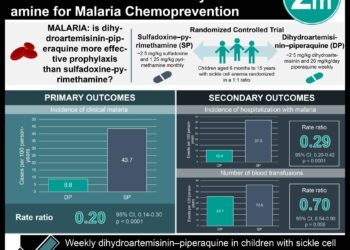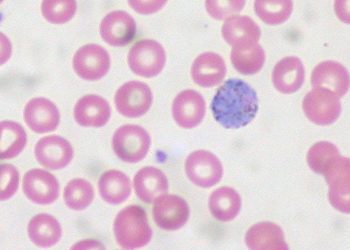RTS,SA/S01 anti-malarial vaccine efficacy wanes significantly over time
1. RTS,SA/S01 malaria vaccine had significantly higher efficacy rates compared to placebo within the first year of administration.
2. Over the course of seven years, RTS,SA/S01 malaria vaccine efficacy rates waned significantly.
Evidence Rating Level: 1 (Excellent)
Study Rundown: Malaria continues to be a significant public health concern, with over an estimated 200 million cases of malaria and 655 000 malaria-related deaths occurring in 2010. RTS,S/AS01 is a malarial vaccine candidate that targets the pre-erythrocytic stage of Plasmodium falciparum. In 2011, researchers involved in phase 3 clinical trials of RTS,S/AS01 reported the first coprimary end point. The report found that at one year of follow-up, RTS,S/AS01 had a significantly higher efficacy rate of 55.8% in children 5 to 17 months of age compared to controls. In the current study, researchers evaluated the efficacy rates of the RTS,S/AS01 vaccine at 7 years of follow-up. The research found that while the three-dose vaccination with RTS, S/AS01 had initial protective benefits against malaria within the first year of administration, the vaccine’s efficacy decreased over time. Furthermore, a trend toward negative efficacy started in the fifth year for the whole cohort. In particular, children who were stratified into a high-malarial index cohort experienced a significantly greater negative efficacy effect. Researchers hypothesized that this malaria rebound, particularly in the high-exposure malaria cohort, may occur because the RTS,S/AS01 does not induce clinical immunity against blood-stage parasites.
Click to read the study, published today in NEJM
Relevant Reading: Efficacy of RTS,S/AS01E vaccine against malaria in children 5 to 17 months of age
In-Depth [randomized controlled trial]: In this double-blind randomized controlled trial, researchers randomly assigned children 5-17 months of age to receive either the RTS,S/A01 vaccine (n = 223) or a rabies (control) vaccine (n = 224) at sites across Kilifi, Kenya and Korogwe, Tanazania. The primary end point was clinical malaria, defined as a temperature ≥37.50C and infection with plasmodium falciparum >2500 parasites/mm3. With regards to total cases of clinical malaria over seven years, the RTS, S/AS01 experienced 1002 episodes and the control group experienced 992 episodes.
Over seven years, there was no significant differences in vaccine efficacy rate when assessed by negative binomial regression with the RTS,S/A01 group having a rate of 4.4% (95%CI 17.0 to 21.9; p = 0.66) in the intention-to-treat analysis and 7.0% (95%CI -14.5 to 24.6; p = 0.52) in the per-protocol analysis. With regards to vaccine efficacy over time, there was a significant interaction between receipt of the vaccination and follow-up time (incidence-rate ratio 1.07; 95%CI 1.02 to 1.14; p = 0.006). Specifically, vaccine efficacy declined from 35.9% (95%CI 8.1 to 55.3; p = 0.02) in the first year to 3.6 (95%CI -29.5 to 28.2; p = 0.081) in the seventh year. Negative efficacy was primarily seen in the high-exposure cohort at the five year follow-up point. The estimated number of malaria cases averted over 7 years was 317 (95%CI -357 to 973) per 1000 children vaccinated with RTS,S/AS01. With regards to safety, there were no significant differences between the experimental and control groups, with 17.9% (95%CI 13.1 to 23.6) and 25.4% (95%CI 19.9 to 31.7).
Image: CC/Wiki
©2016 2 Minute Medicine, Inc. All rights reserved. No works may be reproduced without expressed written consent from 2 Minute Medicine, Inc. Inquire about licensing here. No article should be construed as medical advice and is not intended as such by the authors or by 2 Minute Medicine, Inc.









